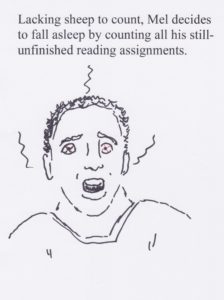Acts, free lecture 2
Genre and historiography
One-hour lecture on the genre and historiography of Acts:
Joseph reveals himself to his brothers—Genesis 45:5-8
Joseph had been “controlling” himself since 43:31, but he could not control himself any longer (45:1). Joseph sends everyone out as he is going to make himself known to his brothers. This reduces security, but at this point he believes that his brothers will not wish him harm; they have regained his trust.
Sending others out also allows privacy, so he can avoid shaming his brothers; questions of the past would undoubtedly surface, and it is no one’s interests for Pharaoh or others to know this past (47:1-2). Joseph may have also wanted to avoid the Egyptians hearing him weep; he had wept in private in 42:24 and 43:30 (although perhaps partly to keep the matter from his brothers). Genesis reports weeping for the dead (23:2; 37:35; 50:1), but also at emotional meetings or reunions (29:11; 33:4), as here (45:2, 14-15; cf. 46:29). If avoiding knowledge of his weeping is at all a motive, however, Joseph fails in this instance. Often sobbing was explicitly quite loud (21:16; 27:38; 29:11)—in this case so much that those outside heard him (45:2).
On revealing himself to his brothers, Joseph’s first question is whether his father is really still alive, a question he had pressed earlier in 43:27. Jacob was already old when Joseph was sold into slavery. Perhaps Joseph also could not be sure whether his brothers were telling him the truth about their father’s desperate anxiety over Benjamin or whether this was simply an emotional ruse to get him to free Benjamin. Conversely, Joseph knew Jacob’s special love for himself and his brother Benjamin, and Judah’s offer of himself instead of Benjamin suggested love for their father as well as for Benjamin. The clearest point here is that Joseph still deeply loves his father and longs to see him.
His brothers are too afraid to answer him, so Joseph summons them to come near (45:4; the command appears earlier in Genesis but in a very different situation, 27:21, 26). Their silence reveals their fear (of Joseph’s revenge) and/or shame (for their behavior), so Joseph addresses the issue openly. Yes, they had sold him to traders heading for Egypt (37:25). But he urges them (45:5) not to remain grieved or angry with themselves. (Genesis earlier uses these two Hebrew terms together, in 34:7, where they slaughtered an entire town for its prince’s abuse of their sister; this is their only use together in the Hebrew Bible, probably suggesting his brothers’ propensity for anger against someone who harmed a sibling—in this case, against themselves. That the leaders of the attack in ch. 34 were the victim’s full brothers rather than half-brothers may not minimize the comparison.)
They should not be angry with themselves because their motives were no longer an issue; God was the one who had sent him to Egypt ahead of them (45:5), thus making ready for them to be able to come (45:9). Genesis does not play off human disobedience and God’s action as mutually incompatible—God does not always prevent human sin, but God is so sovereign that, on a higher level, he has a larger plan that can incorporate even actions such as those to accomplish his long-range purposes in history.
God, who can work sovereignly even in the midst of human disobedience, had a larger purpose—to save lives (45:5). In saving the family God had a long-range purpose in history, but God also had a purpose in saving lives in Egypt and Canaan as well (45:5). Joseph’s words here illustrate God’s compassion toward all people. It is God’s ideal, all other matters being equal, to raise up those who will deal wisely and honestly, heeding his warnings, and provide for those who suffer from famine and other kinds of natural disasters.
Those who overeat this holiday may want to follow the example of …
The shepherds’ crooks
Christmas burglar
Matthew 26-27
Lecture 18
Free one-hour lecture on Matthew 26-27 (free session 18). This one was scheduled for Dec. 8 but looks lie it somehow didn’t post.
Paradigm shifts
Acts, free lecture 1
Authorship, date and genre
One-hour free lecture on introduction to Acts (authorship, date and genre):
Taking responsibility: Judah has grown up—Genesis 44:16-34
Joseph accuses his brothers of wrongdoing regarding his silver cup (the “you” in 44:15) is again plural. Not realizing that Joseph is their brother, or that the real issue of their wrongdoing is something more than a silver cup, the brothers are frightened.
Judah, however, speaks up. He does not try to show himself or his brothers in the right (44:16); indeed, the only other use of this verb in Genesis is when Judah earlier admits that Tamar was more in the right than he (38:26). Judah confesses that God has revealed their iniquity (44:16); if God is the one who had given them in their sacks (43:23) money, which they once valued enough to sell their brother Joseph, God is also the one who gave Benjamin this official’s cup. They are now facing the consequences of a terrible past sin. Although they could not hope to persuade the official, Judah in fact realizes that, regarding the real offense, Benjamin is the only fully innocent one among them!
Judah’s words undoubtedly stir Joseph’s emotions—and those of Genesis’s informed audience—more than Judah within the narrative can know. Judah pleads for compassion for their aged father, who still mourns the apparent death of Joseph and will die if Benjamin is not brought back (44:27-31). Jacob has never fully recovered from the trauma of losing Joseph, and is deathly afraid of anything happening to his other son by his “wife” (singular, 44:27). (The term that can be translated “harm” in 44:29 appears in Genesis only in Jacob’s fears for what could befall Benjamin in Egypt—elsewhere in 42:4, 38.)
Judah laments that if he and his brothers return without Benjamin they will precipitate their father’s death. Although such language could refer to their role as catalysts of his death, Judah’s words probably also suggest their more direct role—betraying their moral guilt. Had Judah and his brothers not sold their brother Joseph, their father’s life would not be in the same level of danger. Judah is not confessing what they did to their brother Joseph, but for the audience who knows the brothers’ guilt, his words reveal his heart. The sons who gave little forethought to how Joseph’s disappearance would affect their father have experienced his anguish ever since and cannot bear to see it again. Sometimes in our immaturity we act on impulse without considering the consequences; our culture today indeed invites us to follow our desires rather than to recognize that we can and normally should control them.
One might think that this danger for his beloved father alone would sway Joseph’s heart: out of love for his broken father, Joseph dare not keep Benjamin there. But Judah is not finished. He now bears responsibility before his father (44:32) in a way that he had not thought of doing with Joseph. Judah has narrated the setting and now climaxes with his plea: Let Judah himself be a slave rather than Benjamin (44:33), lest Judah have to witness his father’s death.
The one brother directly responsible for selling Joseph into slavery (37:26-27) is now the one who prefers his own enslavement to that of Joseph’s full brother Benjamin. Judah’s experience with Tamar made his own sinfulness impossible to evade (38:26); confronted with the selfish kind of person he had actually been, Judah has changed. Even dysfunctional families can change; God can heal relationships. Israelites who heard this story of their forebears would also recognize both the way people mature in different stages of life and God’s grace forgiving and working to unite their sinful people in the past. (Judah’s leading role also figures in 46:28; he has emerged as a major figure in the narrative, just as his tribe and Joseph’s Ephraimite tribe will be two of the most dominant tribes.)
Joseph had been “controlling” himself since 43:31, but he could not control himself any longer (45:1). He is now about to reveal himself to his brothers.





